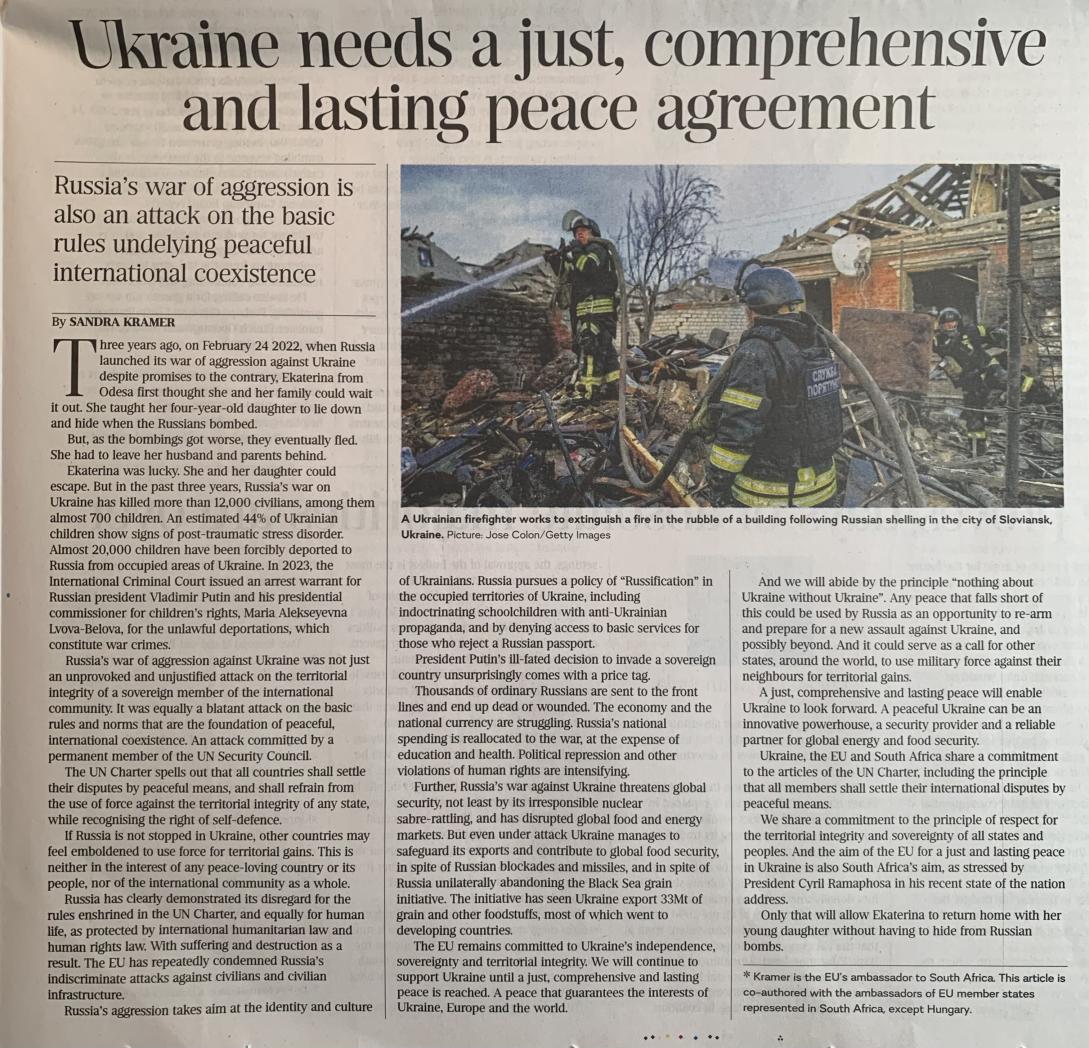Ukraine needs a just, comprehensive and lasting peace deal

Three years ago, on February 24 2022, when Russia launched its war of aggression against Ukraine despite promises to the contrary, Ekaterina from Odesa first thought she and her family could wait it out. She taught her four-year-old daughter to lie down and hide when the Russians bombed. But, as the bombings got worse, they eventually fled. She had to leave her husband and parents behind.
Ekaterina was lucky. She and her daughter could escape. But in the past three years, Russia’s war on Ukraine has killed more than 12,000 civilians, among them almost 700 children. An estimated 44% of Ukrainian children show signs of post-traumatic stress disorder. Almost 20,000 children have been forcibly deported to Russia from occupied areas of Ukraine. In 2023, the International Criminal Court issued an arrest warrant for Russian President Vladimir Putin and his presidential commissioner for children's rights, Maria Alekseyevna Lvova-Belova, for the unlawful deportations, which constitute war crimes.
Russia’s war of aggression against Ukraine was not just an unprovoked and unjustified attack on the territorial integrity of a sovereign member of the international community. It was equally a blatant attack on the basic rules and norms that are the foundation of peaceful, international coexistence. An attack committed by a permanent member of the UN Security Council. The UN Charter spells out that all countries shall settle their disputes by peaceful means, and shall refrain from the use of force against the territorial integrity of any state, while recognising the right of self-defence.
If Russia is not stopped in Ukraine, other countries may feel emboldened to use force for territorial gains. This is neither in the interest of any peace-loving country or its people, nor of the international community as a whole.
Russia has clearly demonstrated its disregard for the rules enshrined in the UN Charter, and equally for human life, as protected by international humanitarian law and human rights law. With suffering and destruction as a result. The EU has repeatedly condemned Russia’s indiscriminate attacks against civilians and civilian infrastructure. Russia’s aggression takes aim at the identity and culture of Ukrainians. Russia pursues a policy of “Russification” in the occupied territories of Ukraine, including indoctrinating schoolchildren with anti-Ukrainian propaganda, and by denying access to basic services for those who reject a Russian passport.
President Putin’s ill-fated decision to invade a sovereign country unsurprisingly comes with a price tag. Thousands of ordinary Russians are sent to the front-lines and end up dead or wounded. The economy and the national currency are struggling. Russia’s national spending is reallocated to the war, at the expense of education and health. Political repression and other violations of human rights are intensifying.
Further, Russia’s war against Ukraine threatens global security, not least by its irresponsible nuclear sabre-rattling, and has disrupted global food and energy markets. But even under attack Ukraine manages to safeguard its exports and contribute to global food security, in spite of Russian blockades and missiles, and in spite of Russia unilaterally abandoning the Black Sea grain initiative. The initiative has seen Ukraine export 33Mt of grain and other foodstuffs, most of which went to developing countries.
The EU remains committed to Ukraine’s independence, sovereignty and territorial integrity. We will continue to support Ukraine until a just, comprehensive and lasting peace is reached. A peace that guarantees the interests of Ukraine, Europe and the world. And we will abide by the principle “nothing about Ukraine without Ukraine”. Any peace that falls short of this could be used by Russia as an opportunity to re-arm and prepare for a new assault against Ukraine, and possibly beyond. And it could serve as a call for other states, around the world, to use military force against their neighbours for territorial gains.
A just, comprehensive and lasting peace will enable Ukraine to look forward. A peaceful Ukraine can be an innovative powerhouse, a security provider and a reliable partner for global energy and food security.
Ukraine, the EU and South Africa share a commitment to the articles of the UN Charter, including the principle that all members shall settle their international disputes by peaceful means. We share a commitment to the principle of respect for the territorial integrity and sovereignty of all states and peoples. And the aim of the EU for a just and lasting peace in Ukraine is also South Africa’s aim, as stressed by President Cyril Ramaphosa in his recent state of the nation address.
Only that will allow Ekaterina to return home with her young daughter without having to hide from Russian bombs.
• Kramer is the EU's ambassador to South Africa. This article is co-authored with the ambassadors of EU member states represented in South Africa, except Hungary.
